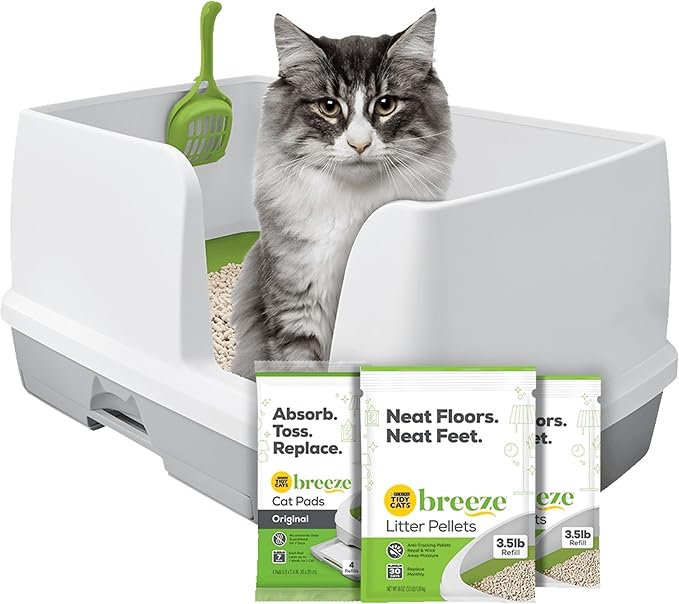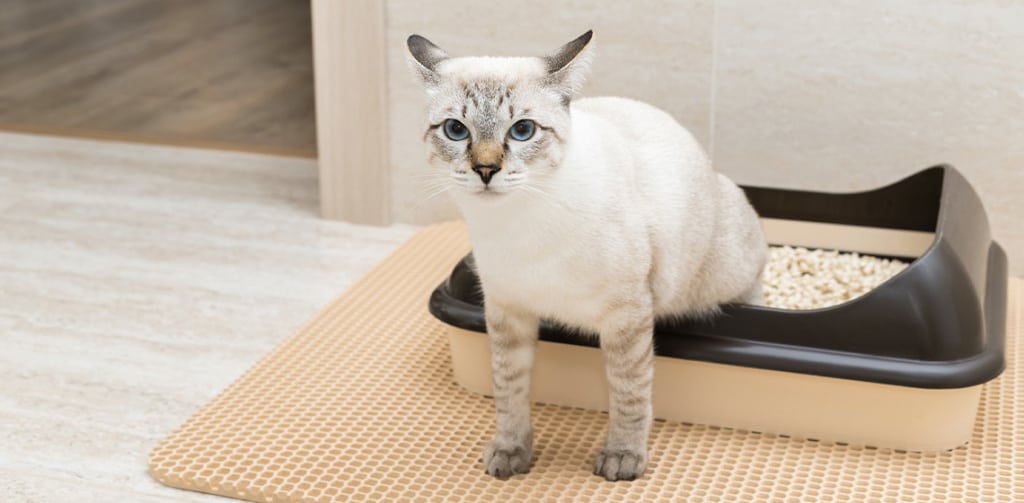If you click on links we provide, we may receive compensation.
If you’re a pet parent to a cat who gets bunged up every once in a while, it can be horrible to see them straining and uncomfortable. So, it’s natural to want to try to help them pass their poop more easily. But how do you know which laxatives are safe for your cat? And are there any other ways that you can help with your feline’s firm feces?
Table of Contents
What is constipation?
If your cat is constipated, they will be passing poop less often, and their poop may be harder or drier than normal. The dry or firm consistency of the feces will cause your cat to strain when they go to the toilet, and they might even pass a bit of blood. Constipation can be caused by your cat being a bit dehydrated or having a blockage. Blockages are sometimes caused by hairballs, worms, dry feces, or even foreign material that they have eaten, which can make a cat throw up as well. Occasionally, constipation can be caused by gut tumors or a condition called ‘megacolon’ where the bowel becomes very large and weak so it cannot push the stools through.
What can help your cat’s constipation?
Constipation tends to become a vicious cycle quite quickly. Feces that has been waiting in the colon or rectum for too long will become drier and drier as the body reabsorbs water from the stool. This causes it to become even harder to pass, and the blockage becomes more significant. The key to easing constipation is to prevent the stools from drying out and get them moving as soon as possible. You can do some things to help at home, but you might need to speak to your veterinarian about laxatives.
A constipated cat might go in and out of the litter box without passing anything. They might also strain, pass hard, dry balls of feces, or even pass some blood.
Tips for helping constipation at home
Water intake
If your cat is experiencing a bout of constipation, one of the most effective things you can do is increasing their water intake. Ensuring that their hydration is as good as possible will help prevent the stools from drying out and lubricate their passage through the bowel. There are many ways that you can encourage your cat to drink more water, including using water fountains, extra water bowls, and running taps. However, if your cat won’t be persuaded to drink more, you can try feeding them wet food and even adding extra water to their food.
Litter boxes
Cats are very clean creatures, and if their litter box is dirty or they have to share it with other cats, they may choose to hold their feces. To avoid constipation, it’s essential that your furry friend feels free to go whenever he needs to. Therefore, keeping litter boxes clean and providing more than one litter box per cat is important to keep your cat toileting stress-free.
To keep things even easier, the Purina Tidy Cats Breeze XL All-in-One System helps control odors and makes cleanup simple, so your cat always has a fresh place to go.

Purina Tidy Cats Non Clumping Litter System, Breeze XL All-in-One Odor Control & Easy Clean Multi Cat Box – 18 lb. Box
10,632
$76.48
Reduce stress
Your cat might also avoid passing poop for as long as possible if they are feeling stressed. This could be from other cats, building work, a new baby, or anything that impacts your cat’s normal routine. Using anxiety-reducing sprays, diffusers, or plug-ins can help keep your cat feeling calm.
If your cat is prone to constipation, you can increase their water intake and reduce their stress to help stop flare-ups.
Laxatives
Microlax
Microlax contains Sorbitol and is administered as an enema into your cat’s bottom. It loosens any blockages and lubricates the bowel so that stools pass more easily. It is only available on prescription, though, so you’ll need to speak to your veterinarian if you think your cat might need it.
Katalax
Katalax contains soft paraffin, cod liver oil, and malt extract. It’s handy for easing blockages caused by hairballs, but it also softens the stools, which can help with constipation. Katalax is an over-the-counter medication, so it doesn’t need to be prescribed by a veterinarian.
Lactulose
Lactulose is a human laxative that contains a non-absorbable sugar, and it draws water into the bowel through osmosis. It can be used in cats under veterinary supervision but is ‘off license’ because it’s not been approved by the licensing authority for use in cats.
Cat Malt
Cat Malt is a combination of liquid paraffin and malt extract. Like Katalax, it is helpful for hairballs and acts as a stool softener, and it can also be bought over the counter.
Laxapet
Laxapet contains fish oils, vitamins, and lecithin and is used for hairballs as well as constipation. It is available over the counter.
When to speak to a veterinarian
With laxatives and stool softeners available over the counter, it might be tempting to try treating your constipated cat yourself without a veterinarian.
Mild cases of constipation may resolve with over-the-counter laxatives, especially if you try to reduce your cat’s stress and increase their water intake. However, because constipation can quickly become a vicious cycle, it’s essential to seek veterinary advice sooner rather than later.
If your cat hasn’t passed any feces at all for two days, you should contact a veterinarian. If your cat is straining and in distress, you should speak to a veterinarian right away. It’s useful to remember that the symptoms of a blocked bladder can be very similar to constipation, and this is a medical emergency. Therefore, if you are uncertain whether your cat is passing urine, it’s best to get them checked over by a veterinarian.
FAQ
Over-the-counter laxatives can work well for mild constipation, but your veterinarian might need to prescribe Lactulose or Microlax or even administer an enema in more severe cases.
While you can’t stimulate a bowel movement, you can make it easier for your cat to pass feces by using laxatives or enemas and increasing their water intake.
Some human stool softeners are safe for cats. However, their use is ‘off-license,’ so they should only be used under veterinary instruction. Many human enemas are extremely toxic to cats, so check with your nearest vet before administering any human medication.
A constipated cat might go in and out of the litter box without passing anything. They might also strain, pass hard, dry balls of feces, or even pass some blood. More severe cases may develop vomiting.
If your cat is prone to constipation, you can increase their water intake and reduce their stress to help stop flare-ups. Over-the-counter laxatives and stool softeners can help to get things moving again in mild cases, but it’s best to contact your veterinarian if symptoms aren’t improving.

Dr. Hannah Godfrey MRCVS graduated from the Royal Veterinary College in 2011. Although she initially worked in mixed practice treating all species, she found a love for small animal work and has worked exclusively with dogs and cats since 2014. She lives in Wales with her partner, son, and two cats (named Poppy and Ashton Kutcher), and writes comedy fiction in her spare time.








